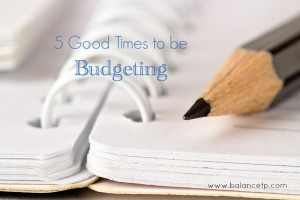Budgeting for most people just isn’t that fun. There are a few of us that get into tracking expenses, making spreadsheets, and trying out the latest budgeting software. But there’s a larger number that would rather just spend money without tracking every dollar.
For the folks that hate budgeting the answer may be to stop trying to do it all the time. Instead plan on budgeting only when your finances are changing. The rest of the time you can just go with the flow. You probably don’t need to budget If you are saving enough for your future goals (house, education, retirement, etc.), paying all your bills on time, and feel like you have a good grasp of what you’re spending your money on.
There are some times, however, when it’s a good idea to pull out the spreadsheet and come up with a plan.
You’ve never tracked your expenditures before
Sometimes it can be quite an eye opener to see how much you spend in certain areas of you life. When you go through your day spending little bits here and there, it’s hard to have a running total in your head. Once you see the totals, you may shift things around a little or decide you would rather be saving more. If you’ve never tracked your spending or you haven’t in awhile, try tracking for at least a couple of months.
You’re getting a raise
Many people just increase their spending in step with their income without giving it much thought. With a plan in place, you can keep your spending in check and more of your raise will go into savings.
Your family is considering living on one income
If you are thinking of having one parent stay at home with the kids, this is a great time to take a look at what you’re spending on and how you can cut back. You may be able to save on things you hadn’t considered now that one parent is at home such as transportation and food. Also take a look at your reoccurring expenses and see if you can eliminate or lower any of these payments. Is there a cheaper cell phone, cable, internet, or insurance plan?
You’re planning on making a large purchase
This could be a new car or house. Take a look at how your budget will change with the purchase. If the purchase includes new debt, figure out what you’ll have to cut back on to make the payments. Also consider any additional expenses that come along with the purchase, such as taxes, repairs, and insurance.
You’re putting together you retirement plan
One of the most important numbers that goes into a retirement plan is how much you’ll be spending each year once you retire. The best way to estimate this number is get a better idea of what you’re spending your money on today. Tracking your expenses for a few months should do the trick. Take a look at what you think may decrease in retirement (transportation, eating out) and what may go up (travel, healthcare costs).
Once you’ve settled into your new routine, you can ease up a little with the budgeting again. Just make sure you’re ready to pull out your spreadsheets when the next change comes along.





